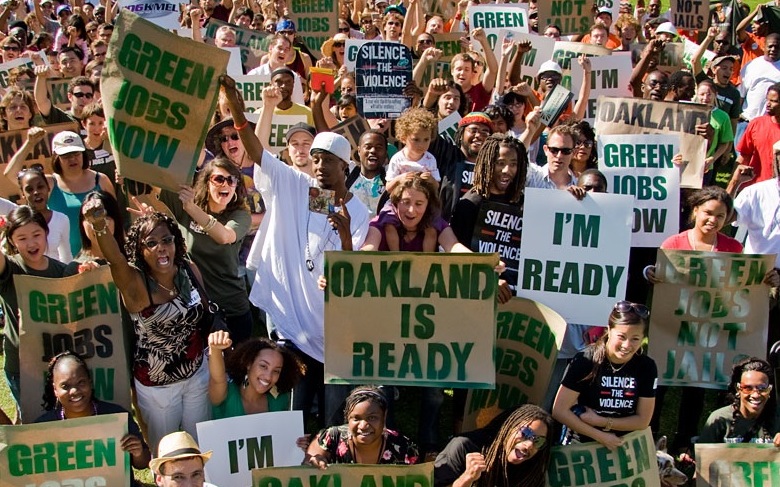Youth + Environment = Turnout
Young people care more about the environment -- whether global warming, renewable fuels, clean energy or energy independence -- than any other demographic. This proves true across party lines.
Jul 31, 2020157.4K Shares2.2M Views
An Oakland, Calif. rally, part of the National Day of Action (Flickr: greenforall.org)
It’s becoming apparent that the youth vote could be a key component of Tuesday’s electorate. Americans age 18 to 30 are expected to turn out in record numbers. This is what the Obama campaign has long been focusing on, since Sen. Barack Obama, the Democratic nominee, does well with voters under 30, according to national polls.
If young voters meet these expectations and turn out to vote, their preferences could influence the electorate. That’s why political organizers and pollsters have been trying to determine exactly what those preferences are.
Illustration by:Matt Mahurin
Like other demographic groups, voters under age 30 are most concerned about the economy. Since, according to the polls, the majority of all voters view Obama as better able to handle economic issues than his opponent, Sen. John McCain, this could be one reason the Illinois senator attracts the youth vote.
But young voters are concerned about more than the economy. While their concerns frequently match those of other demographics, there’s at least one issue where they diverge: the environment.
The environment is the major exception for youth voters, according to Carroll Doherty, the associate director at the Pew Research Center. In an October poll, 64 percent of voters under age 30 said the environment is “very important,” compared to 55 percent of older voters.
“At a time when there is so much convergence in priorities,” Doherty said, “that is a noticeable, significant difference.”
He attributes the difference to greater environmental consciousness among young people. For example, young people are more concerned about human effects on global warming than any other age group, according to an April Pew poll.
What’s most noteworthy about this interest in the environment is that it crosses party lines.
Young Republicans and conservatives, for example, see a need for more investment in clean energy, said Ashley Barbera, communications director for College Republicans. “A lot of [them] support alternative energy but have different reasons for that support — whether it’s climate change or [cutting the] cost of energy or [reducing] dependence on foreign oil.” For more and more young people, she says, “climate change is something that needs to be addressed.”
In this way, young conservative voters diverge from older conservatives, since the GOP base has not called for action on climate change, according togroups like the Heritage Foundation.
Nonpartisan political organizers are also finding that young voters are bipartisan when it comes to the environment. Generation Vote, a coalition of 20 youth organizations working to get out the vote, declared climate change the No. 5 issue on its “Youth Agenda,” which ranks the nine issues most important to young voters.
Stephanie Young, Rock the Vote communications associate, also said that young people across the political spectrum want to see more done to control climate change using clean-energy technologies. “Among young people,” she said, “Democrats, Republicans and independents can agree that the environment is extremely important, and that climate change is a problem.”
That’s because, Young contends, younger generations “have always been at the cutting edge of what’s going on in environmental protection.” They have grown up knowing how important it is to recycle, conserve energy and conserve water. “We have a much different perspective than other generations,” she said.
Young people may also be interested in the environment because they tend to see environmental and economic interests as compatible, some organizers conjecture.** **That may explain why the creation of more green jobs has emerged as an important issue for them. During the National Day of Action for Green Jobs, in September, youth turnout at events across the country was impressive.
This video of the National Day of Action, produced by Rock the Vote and Wiretap Magazine, captures a number of young environmental activists working to bring green jobs to people of all economic backgrounds:
Jessy Tolkan, executive director of the Energy Action Coalition, an umbrella youth environmental group, is working to mobilize 1 million young Americans to vote on climate and energy issues Tuesday through its Power Vote campaign.
“This generation,” Tolkan said. “sees the economy and energy and the environment as 100 percent linked.” But this isn’t new, she adds, because young people have been at the forefront of the movement advocating more green jobs and greater clean-energy investment for at least two years.
Climate change has become a determinant in some young people’s vote. “What I hear time and time again from young voters, ” said Tolkan, “is that the defining issue of our time is going to be whether or not this generation in this country stood up and dealt with climate change and energy solutions — or whether we ignored the writing on the wall and allowed this catastrophe to happen.”
Tolkan also finds that young voters, whether Republican, Democratic or independent, are largely disappointed with the environmental rhetoric they’ve heard from both presidential candidates. “What I’ve heard from [them],” said Tolkan, “is that neither candidate has gone far enough to lay out how he is going to address [these issues].”
In any discussion of young voters, it can’t be ignored that national polls show Obama leading overwhelmingly with those under 30. Pew, for example, puts the Democratic nominee ahead, 68 percent to 24 percent.
Alexandra Acker, executive director for Young Democrats for America, says this is because of Obama’s stand on three of the most important issues to young people: the economy, the war in Iraq and the environment/energy. Young voters see those issues as connected, she says.
“Young people were the first group to turn away from the war — to see the war in Iraq as a war of energy,” she said. “Young people want a commonsense approach to breaking our dependence on oil. They want to invest in clean energy and new technologies. They want to find new energy but reduce our carbon footprint.”
Acker says more young people trust Obama’s platform than Sen. McCain’s. “Just because John McCain says he’s an environmentalist, doesn’t make it so,” she said. “He has low ratings from the environmental groups [because of his voting record on conservation].”
With young people expected to vote in record numbers, this portion of the electorate could wield great power. Acker says young voters may well make issue-based decisions on Tuesday, regardless of what others might expect.
“Contrary to every stereotype, young people are taking this election very seriously,” Acker continued. “They’re voting on the issues, not on personality. More than any other age group, they’re worried about our economy. We’re the ones who are going to inherit [economic problems]. We’re the ones who will inherit environmental problems.”

Rhyley Carney
Reviewer
Latest Articles
Popular Articles

